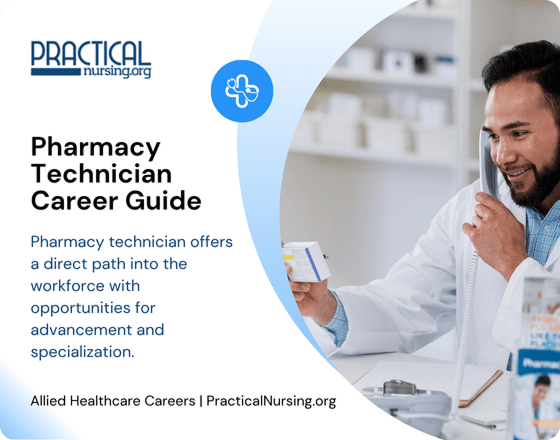How to Become a Pharmacy Technician
Embarking on a career as a pharmacy technician not only represents a pivotal step in your professional journey but also opens doors to a dynamic and profoundly rewarding profession nestled within the expansive landscape of the healthcare sector.

Written by Jane Dewy and Edited by The PracticalNursing.org Editorial Team.

How to Become a Pharmacy Technician
 Embarking on a career as a pharmacy technician not only represents a pivotal step in your professional journey but also opens doors to a dynamic and profoundly rewarding profession nestled within the expansive landscape of the healthcare sector. Those researching allied healthcare roles alongside licensed practical/vocational nursing may wish to also consider this entry-level role. Our comprehensive guide seeks to be your compass, navigating you through the intricate steps that define the path toward becoming a proficient pharmacy technician.
Embarking on a career as a pharmacy technician not only represents a pivotal step in your professional journey but also opens doors to a dynamic and profoundly rewarding profession nestled within the expansive landscape of the healthcare sector. Those researching allied healthcare roles alongside licensed practical/vocational nursing may wish to also consider this entry-level role. Our comprehensive guide seeks to be your compass, navigating you through the intricate steps that define the path toward becoming a proficient pharmacy technician.
Step 1: Understand the Role of a Pharmacy Technician
The first step in your journey is gaining a comprehensive understanding of the pharmacy technician’s role. As a crucial member of the healthcare team, pharmacy technicians support pharmacists in various tasks, including dispensing medications, managing inventory, and ensuring the accurate processing of prescriptions. Delving into the specifics of the role will not only clarify your career goals but also underscore the significance of attention to detail and effective communication.
Pharmacy Technician vs LPN
Entering the healthcare field presents various opportunities, each with distinct roles that contribute to patient well-being. It’s essential for aspiring healthcare professionals to differentiate between roles to make informed decisions about their career paths. There are some key differences between pharmacy technicians and licensed practical nurses (LPNs), two professions that, despite both being involved in patient care, operate in unique medical settings and focus on different aspects of healthcare.
Pharmacy Technicians primarily focus on:
- Medication Management
- Inventory Control
- Patient Interaction
- Collaboration with Pharmacists
- Insurance Processing
Licensed Practical Nurses (LPNs) primarily focus on:
- Comprehensive Patient Care
- Wound Care and Procedures
- Patient Advocacy
- Collaboration in Care Plans
- Health Education
Step 2: Fulfill the Educational Requirements of a Pharmacy Technician
While a high school diploma is the minimum requirement, formal education significantly enhances your prospects. Explore pharmacy technician training programs offered by vocational schools, community colleges, or online institutions. These programs cover vital subjects such as pharmaceutical calculations, pharmacy law, and pharmacology, providing both theoretical knowledge and practical experience in simulated or real pharmacy settings.
Certification
While certification isn’t obligatory, it can distinguish you in a competitive job market. Organizations like the Pharmacy Technician Certification Board (PTCB) and the National Healthcareer Association (NHA) offer nationally recognized certification exams. Meeting specific education and experience prerequisites, the certification process typically involves an exam assessing your understanding of pharmacy procedures, regulations, and patient safety. Maintaining certification through continuing education ensures you stay abreast of industry advancements.
Step 3: Apply For Pharmacy Technician Jobs
Armed with education and certification, the next step is applying for pharmacy technician positions. Opportunities abound in various settings, from retail pharmacies to hospitals. Tailor your resume to highlight your education, certification, and any relevant experience. Showcase your skills, emphasizing attention to detail and adaptability in fast-paced environments. Networking within the healthcare community, attending job fairs, and perusing online job boards can unveil potential opportunities. Prepare for interviews by researching common pharmacy technician questions and practicing your responses.
More Allied Healthcare Careers
Discover more allied healthcare career guides and resources for practical nursing professionals and students to understand the available opportunities.
Provide hands-on care and daily support to patients in hospitals, nursing homes, and long-term care facilities. Learn how to become a CNA and start your healthcare career quickly. Explore CNA programs and career paths.
Play a key role in clinics and physicians’ offices by handling both administrative and clinical tasks. Medical assisting offers fast entry into healthcare with strong job growth. Learn how to become a medical assistant.
Specialize in drawing blood and preparing samples for lab testing, an essential role in diagnostics and patient care. See what it takes to become a phlebotomist.
Assist dentists during procedures, manage patient care, and keep dental offices running smoothly. This in-demand role offers fast-track training and career stability. Get started as a dental assistant today.
Related Articles
- LPNs in Community Health Settings: Roles, Rewards, and Requirements
- LPN Training & Financial Aid for Veterans and Military Service Members
- Caring for History
- Confessions of a Nurse: Ask Me About My Shoes
- California LVN Licensure and Challenging the Boards
- Choosing the Right LPN/LVN Bridge Program: Pathways for Advancement
- Licensed Practical Nurse (LPN) vs Certified Nursing Assistant (CNA)
- 8 Roles of the LPN